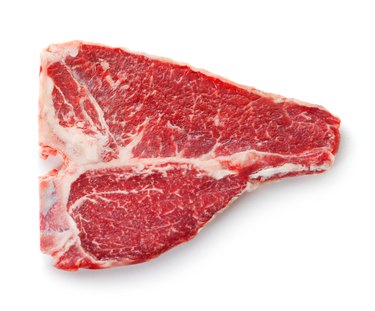
A high-protein diet is a popular option individuals who are trying to lose or gain weight. Because protein constitutes the building blocks of muscle, followers of high-protein diets hope to gain muscle, or preserve muscle mass while trying to lose weight. Diets excessively high in protein can have a negative impact on the renal system, however. These effects show up in urine, which is a waste product of the renal system.
Urea
Video of the Day
Protein is made up of nitrogen, carbon, oxygen and hydrogen molecules. The body can metabolize all of those but nitrogen. Nitrogen is essential for forming many different amino acids necessary for body function, but excess nitrogen must be excreted. The liver converts excess nitrogen to urea, which then travels through the blood and to the kidneys to be filtered out. A high-protein diet may result in increased urea production; excess urea may show up in the urine.
Video of the Day
Urination
A high-protein diet facilitates greater production of urine volume. The increase of urea in the body, drives the need for more filtration by the kidneys. This means that more water is pulled from the blood to compensate for urea removal. Excessive urination while following a high-protein diet can lead to dehydration, notes The American Kidney Fund.
Calcium
A study conducted by Roichi Itoh, appearing in the American Journal of Clinical Nutrition in 1998, found that increased protein consumption leads to increased calcium in the urine. Although the exact mechanism for this is not well understood, the impact of excessive calcium loss is still highly important. Calcium loss is associated with a loss in bone mineral density and an increase in osteoporotic conditions, especially in the elderly.
- The Medical Biochemistry Page: Nitrogen Metabolism
- Atkins Exposed: American Kidney Fund Warns About Impact Of High-Protein Diets On Kidney Health
- "The American Journal of Clinical Nutrition"; Dietary Protein Intake and Urinary Excretion of Calcium; Roichi Itoh, Noriko Nishiyama and Yasuo Suyama; 1998.
- MayoClinic.com: Protein in Urine